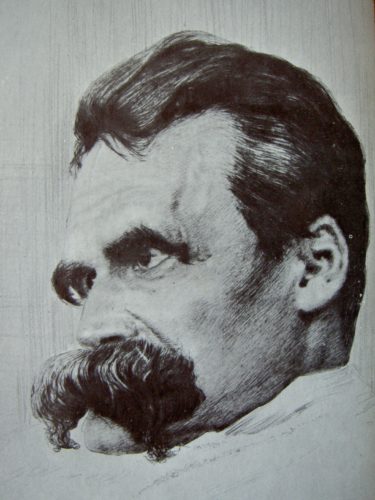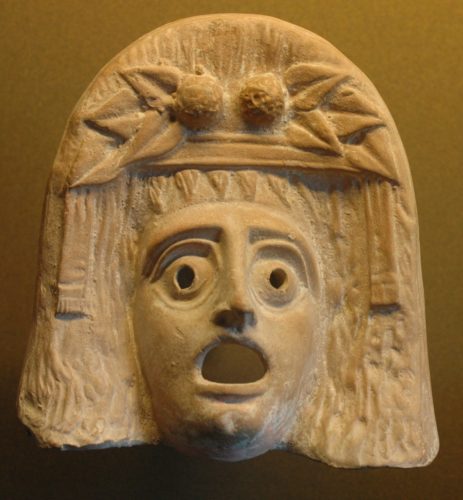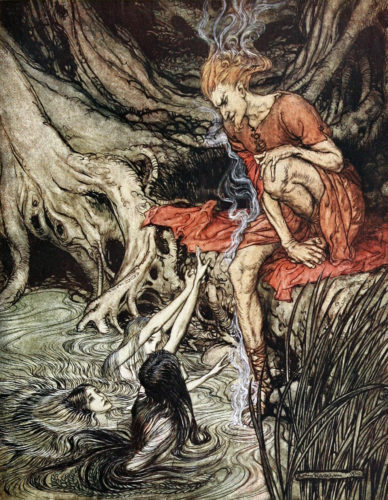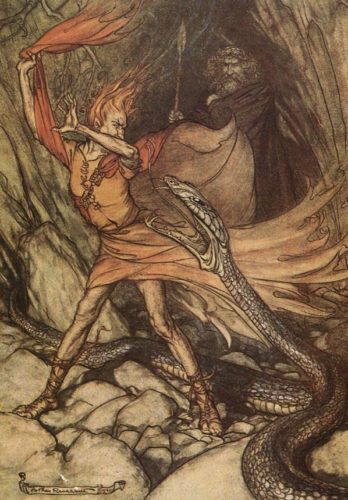![]()
“Have I been understood? Dionysus against the Crucified!” —Nietzsche, final line of Ecce Homo

Drawing by Hans Olde [public domain].
Nietzsche’s relationship with Dionysos far predated 1889, stretching back to The Birth of Tragedy, published in 1872. In “Does the Acéphale Dream of Headless Sheep?,” Jeremy Biles quotes Georges Bataille on the source and essence of Nietzsche’s philosophy:
Writing in a 1937 issue of the short-lived journal Acéphale, under the double heading “Nietzsche Dionysus,” Georges Bataille proclaims, “The very first sentences of Nietzsche’s message come from ‘realms of dream and intoxication.’ The entire message is expressed by one name: Dionysus.
In The Birth of Tragedy, Nietzsche wrote of the Apollonian sphere of influence as “this deep consciousness of nature, healing and helping in sleep and dreams,” and of the Dionysian as irrationality and intoxication:
Schopenhauer has depicted for us the terrible awe which seizes upon man when he is suddenly unable to account for the cognitive forms of a phenomenon, when the principle of reason in some one of its manifestations seems to admit of an exception. If we add to this awe the blissful ecstasy which rises from the innermost depths of man, aye, of nature, at this very collapse of the principium individuationis, we shall gain an insight into the nature of the Dionysian, which is brought home to us most intimately perhaps by the analogy of drunkenness.
It is either under the influence of the narcotic draught, which we hear of in the songs of all primitive men and peoples, or with the potent coming of spring penetrating all nature with joy, that these Dionysian emotions awake, which, as they intensify, cause the subjective to vanish into complete self-forgetfulness.

Terracotta figurine of a mask of Dionysos [public domain].
Nietzsche saw tragedy as the synthesis of the antitheses of Dionysian ecstasy and Apollonian dream. He wrote that Dionysos was the original hero of early tragedy, and that “until Euripides, Dionysus never once ceased to be the tragic hero; […] in fact all the celebrated figures of the Greek stage—Prometheus, Oedipus, etc.—are but masks of this original hero, Dionysus. There is a godhead behind all these masks. And indeed, according to Arthur Pickard-Cambridge, Dionysos was worshiped during the Lenaia “in the form of a bearded mask set upon a pole, pillar, or column, often apparently of wood.”
The Birth of Tragedy was originally addressed to Richard Wagner, whom Nietzsche admired and was friends with at the time. By 1876, however, as he wrote in Nietzsche Contra Wagner, he had come to despise Wagner for his anti-Semitism, his turn toward Christianity, and other irreconcilable differences. “I regarded German mythology as a solvent, as a means of accustoming people to polytheism,” he wrote.
Nietzsche was absolutely right to see the potential for polytheism within the retelling of old myths. Wagner did not share Nietzsche’s interest in “accustoming people to polytheism,” but the gods are able to use even negative portrayals to make themselves known. Certain gods are particularly well known for this type of cleverness.
The Cunning God
“Behold the good and just! Whom do they hate most? The man who breaks their tablets of values, the breaker, the lawbreaker—yet he is the creator.” —Nietzsche, Thus Spoke Zarathustra

Snaptun Stone, public domain.
In Playing With Fire: An Exploration of Loki Laufeyson, Dagulf Loptson notes that “the source which most famously portrays Loki as a fire god wasn’t written in the ninth, the 10th, or even the 15th century. It was in 1876 that Wagner’s Der Ring des Nibelungen (“The Nibelung’s Ring”) was first performed in its entirety” (136). Loki’s identity as a fire-associated deity is suggested by older sources as well, such as his possible association with the fiery world of Múspellheimr (Völuspá 51), his incendiary curse upon Ægir’s hall (Lokasenna 65), the Snaptun Stone—a Danish bellows-guard depicting a figure with sewn lips (Loptson 145), and various Scandinavian folk sayings explicitly invoking Loki in relation to flame and heat (ibid. 147).
Loptson specifically argues that Loki was “originally responsible for carrying burnt sacrifices to the gods and freeing the souls of the dead via cremation,” and that therefore “it is only natural that the Catholic Church would have found him particularly deplorable,” perhaps even adding an additional layer of meaning to post-conversion depictions of the binding of Loki (153-154).
In Wagner, however, Loge (the Germanized form of Loki) is never bound, or perhaps, in Loki’s return to the stage, he and Dionysos—the god of theater, as well as Lusios (Loosener) and Eleutherios (Liberator)—broke those chains, and began acting as a “solvent,” began “accustoming people to polytheism.” But not a polytheism of historical reenactment. A polytheism that overturns the world we live in, that reevaluates all values, that breaks old tablets and inscribes new ones.

Arthur Rackham [public domain].
Loptson quotes a particularly striking passage from the libretto of Das Rheingold, the first opera in Wagner’s Ring Cycle, in which Loge not only references his fiery nature, but describes his unique relationship to fate and the gods:
They are doomed to disaster, though they think they are invulnerable. I’m almost ashamed to have anything to do with them. Changing back to flickering flame is a tempting prospect indeed. Consuming those who tamed me instead of stupidly sharing their fate, however divine they may be. That might be the wisest course. I’ll think it over. Who knows what I’ll do? (qtd. Loptson 136)
In Wagner’s portrayal, Loge foresees the impending doom of the gods, and calculates his course of action accordingly. His prescience allows for rational action, following the “wisest course,” which ultimately means acting as an agent of fate. From the perspective of any who do not see “the Moira [or Erda and the Norns, in this case] enthroned inexorably over all knowledge,” however, Loge’s actions may seem unpredictable or even random: “Who knows what I’ll do?” Similarly, in Skáldskaparmál 16, Loki is given the kenning inn slægi áss, “the cunning god.”
In Das Rheingold, Wotan does not know the dangers of the ring, and it is Erda, whom Wagner makes the mother of the Norns, who warns Wotan:
I know whatever was;
whatever is,
whatever shall be
I also see:
the eternal world’s
first ancestress,
Erda, warns you.
My womb bore
three daughters,
conceived before the start of time;
what I see,
the Norns nightly tell you.
In the Icelandic lore, the völva of Völuspá, who proclaims, “Widely I saw | over all the worlds” (30), gives Óðinn, Loki’s blood-brother (Lokasenna 9), whose name means “fury,” a similar knowledge of Ragnarök.
Loki’s burning cunning, like Dionysos’s ecstatic tragedy, like Óðinn’s frenzied wisdom, serves fate, and thereby transcends the distinction between the rational and the irrational. The truly rational being accepts that they cannot escape fate, the wholly irrational creature follows fate through instinct. The sacrificial and crematory fire, like all fire, is neither rational nor irrational in human terms, and even when suppressed or contained, can never be truly “bound.”
In the Jahrhundertring, the centennial production of the Ring Cycle in 1976, Loge closes the curtains at the end of Das Rheingold, staring at the audience while he does so. In his mastery of the scenery of the stage, a fundamentally Dionysian landscape, and his breaking of the fourth wall, he recalls Puck from A Midsummer’s Night’s Dream. Remember that Nietzsche Dionysus, in one of his 1889 letters, listed Shakespeare (or more precisely, Francis Bacon) among his previous incarnations on earth. Incidentally, “fairy” is derived from Latin fata, the plural of fatum, “that which is ordained; destiny, fate.” The etymology is mysterious, but perhaps it relates to a similar “irrationality” embedded within a larger web of relationships.

Arthur Rackham [public domain].
Fate
“Precisely this is godlike that there are gods, but no God.” —Nietzsche, Thus Spoke Zarathustra
In Aeschylus’s Prometheus Bound, we learn that even Zeus is subject to the Fates:
Chorus : Who then is the helmsman of Necessity?
Prometheus : The three-shaped Fates and mindful Furies.
Chorus : Can it be that Zeus has less power than they do?
Prometheus : Yes, in that even he cannot escape what is foretold.
Paradoxically, however, fate includes chaos. Fate is simultaneously the act of weaving, with all its messiness, and the weavers themselves, and all that which is woven and unwoven. In “Loki’s Goatse’an Mysteries (We’re Going Deep. Goatse Deep),” Loki proclaims:
I am the force of chaos. I am the luck bringer who disrupts the order, who breaks the rules, who violates the taboos. I bring choice and free will. I insert the wild card threads into the weaving. And I pull apart the threads that have become too binding, I dissolve the threads whose time is done (whether you believe their time is done or not, your belief does not factor into this very much, except for when it does but that’s another mystery for another day).
The old order’s threads have become too binding, they are dissolving, their time is done. What will take their place? Nietzsche describes a world of many gods, a world of dancing and playing, a world where necessity and freedom are one and the same:
Arthur Rackham [public domain].
All becoming seemed to me the dance of gods and the prankishness of gods, and the world seemed free and frolicsome and as if fleeing back to itself—an eternal fleeing and seeking each other again of many gods, as the happy controverting of each other, conversing again with each other, and converging again of many gods.
Where all time seemed to me a happy mockery of moments, where necessity was freedom itself playing happily with the sting of freedom. (Thus Spoke Zarathustra, “On Old and New Tablets”)
Such a world is already—continuously—in the process of becoming, of fleeing back to itself. It’s simply a matter of learning to see it and live in it. And to defend it, both against the death throes of the old world and against the emptiness of nihilism.
* * *
The views and opinions expressed by our diverse panel of columnists and guest writers represent the many diverging perspectives held within the global Pagan, Heathen and polytheist communities, but do not necessarily reflect the views of The Wild Hunt Inc. or its management.
The Wild Hunt is not responsible for links to external content.
To join a conversation on this post:
Visit our The Wild Hunt subreddit! Point your favorite browser to https://www.reddit.com/r/The_Wild_Hunt_News/, then click “JOIN”. Make sure to click the bell, too, to be notified of new articles posted to our subreddit.


Pingback: TWH: Loki and Dionysos | Heathen Chinese